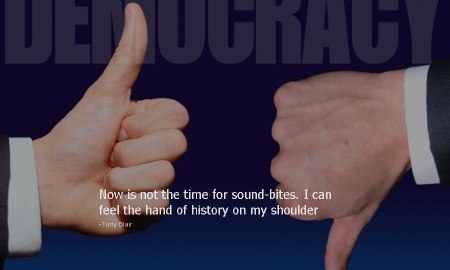Spreading Global Democracy, One Tweet at a Time

Twitter… Twitter.. Twitter. When I receive an email announcing that my dad in Florida is following me on twitter, I know something’s up. He has no Facebook account. It was a major event to show him how he could watch videos of his grandson on YouTube, but suddenly he has a Twitter account. This could only mean one thing: Twitter is taking over the world.
We all saw twitter begin its rush to world dominance when we heard of 140 character panic riffs coming out of the Mumbai Taj during the terrible attacks in November. Since then, Twitter and social networking tools in general, seem to be popping up everywhere. On CNN and MSNBC, John McCain is attacking budgets through small 140 character haikus and bragging about it on Leno.
Abroad, particularly in countries with strong (read totalitarian) central leadership and scant free press, social networks are quickly becoming powerful tools for political organization. Facebook and Twitter have been used to quickly rally protests in the Middle East, the G20 summit, and Africa. These have cemented social networks as the pre-eminent tools for mobilizing people en masse today. No matter what John McCain thinks, Twitter is not great for disseminating policy information, but, for meeting your friends at the pub, or on Tahrir al Kabir for some flag burning, it can’t be beat.
So what does all this mean for diplomacy in the age of Obama? Much has been made recently of State Department officials using Twitter and other tools. There is something great about undersecretaries bypassing layers of public affairs bureaucracy to announce that Ahmedinijad is really going on a bit at this racism conference, and oh look, the ambassador of Djibouti has just walked out. With Obama’s new tech savvy administration, this will be the age of Public Diplomacy 2.0. But, as ably displayed by team Obama in the election, these are tools best utilized for social action, not simple information distribution, lets be proactive.
Twittering under-secretaries are all well and good, but how will the US best utilize and take advantage of the social organization that will be taking place on these networks over the next decade? It would seem that American diplomacy needs more than cute PR tricks, and to do better than the general broadcast efforts such as the Arabic Language satellite channel “al Hurra” and Radio Liberty. As social networks become more and more omnipresent globally, American foreign policy needs a coherent policy to use them.
Presumably they are already being used by our spies. While Lebanese youth might be organizing their next rally in support of Hezbollah on Facebook, the data storage facilities and servers channeling those packets of info are still presumably housed in the US on the banks of the Delaware River (or somewhere like that). In terms of access to information, this would seem to offer a very interesting advantage to team USA. If the government was prepared to strong arm telecom companies into tapping our phone records, checking out foreign nationals online would seem an easy mark. While its true that NSA interest into someone breaking up with their girlfriend may be limited, these networks do represent an interesting way of gauging public opinion in foreign countries in real time. Pre-empting political protests, and reaching their leaders even before they happen, suddenly became that bit easier.
This would seem to mean that it is in US interests that American social networks such Facebook, Twitter etc. become the dominant social networks globally. Should Xiaonei grow and grow, it would represent a separate social network in China that mirrors the separate society that actually exists in the real world. So it would seem that U.S. foreign policy suddenly has an interest in seeing U.S. social networks succeed globally, not just as an advantage to U.S. business, but is actually now as a national security issue.
However a more ‘soft power-ry’, altruistic, use of level social networks would be to facilitate action in other countries around causes and issues that the US thinks are important. We don’t have to (yawn) explain US policy in detail, but we can set up groups and facilitate action around causes we think mirror our interests, like global warming or nuclear power. At the very least we can start a real un-mediated dialogue with populations of different countries. If these efforts were really consolidated and organized they would represent a new arm of public affairs to the rest of the world. At the very least some inexpensive and informal polling—“it turns out seven out of ten of our ‘support nuclear disarmament’ group thought the President’s speech sucked.”
Why shouldn’t the U.S. encourage people in different countries to show support for its efforts, especially if related to specific causes rather than policy as a whole? I quite like the idea of our ambassador in the UN announcing that 100 million people globally have signed up to support some measure on nuclear disarmament, and are having a peaceful protest the next day. We in turn can refine our language and or policies—all very transparent. Just as President Obama promised transparency in the White House, let’s offer it to the rest of the globe.
These aren’t cheap tricks; they are actually a new avenue of engagement with the world. Let’s use it.




